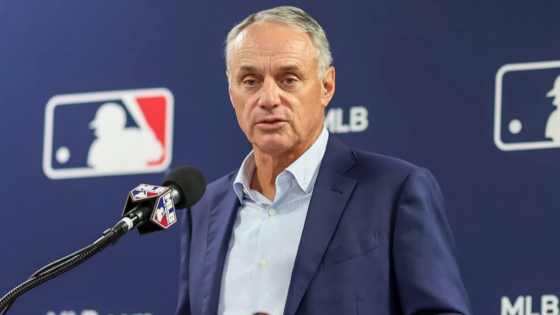It all sounds simple: end the blackouts, make every game available to each fan. However, when MLB tries to push toward a more national and streamlined broadcast model, things get intricate quickly. Specifically, when two powerhouse teams — the Dodgers and the Yankees — are sitting on massive local TV deals, which help to fuel their financial dominance. For MLB, the aim is clear: modernize viewing, expand reach, and delete frustrating restrictions. However, that vision is running into resistance.
Because when national access threatens big-market cash flow, well-intentioned reform hits a wall. For seasons, baseball fans have groaned related to blackout restrictions. However, now, Rob Manfred is making it his mission to finally transform that. “We need to streamline our offering and get out of the blackout business,” he said to Pat McAfee, cutting straight to the issue.
Manfred did not stop there. Speaking on the disrupted media environment, the commissioner said, “It is hardest for us because we’re the most locally dependent in the RSN model.” His outcomes? Shift toward a national model with broad exposure and consistent delivery across streaming platforms. The commissioner also dropped a telling instance: “We took over the Padres’ local broadcast… Within two weeks, we lit up MLB.TV in-market and sold 20,000 subscriptions. What does that tell you?” It tells us fans are ready. However, the league? Still fractured.
This is where the plan hits its biggest snag. Centralizing media rights across all 30 MLB teams could become a streaming jackpot. However, there is one catch: the Yankees and Dave Roberts’ team are in no mood to share. Their local TV deals are goldmines—YES Network and SportsNet LA rake in massive dollars and provide these teams full control over how the team’s games are marketed and distributed. Leaving that? It is not just a financial loss; it is a power transformation. As sportscaster Lee Hackshaw Hamilton said, “Teams like the Yankees, Mets, Red Sox, and Dodgers… are not giving those rights back to baseball.”
“We wanna sell more games nationally and we think it’s good for the game..
We need to streamline our offering and get out of the blackout business..
We’ve got people that wanna watch games and they can’t” ~ Rob Manfred #ProgrumSummerRoadTrip pic.twitter.com/1TO4RKxte3
— Pat McAfee (@PatMcAfeeShow) July 14, 2025
However, it is not just related to ego—it is business. The Dodgers have a TV deal locked through 2038. The Yankees own their network. Why would such teams sacrifice autonomy and billions just to help the league establish a unified streaming model? To them, Manfred’s approach is not modernization, it is a revenue raid, and while MLB is still licking its wounds after ESPN pulled out, Rob Manfred’s $1.5 billion regret hangs over MLB like a storm cloud. Without full rights control, he can not promise premium value to powerful partners. The outcome? Stalled negotiations, shrinking media revenue, and a fan left asking, “Why can not I watch my team?”
While MLB battles to modernize its media reach, another vital evolution is unfolding on the field, one that could forever transform how the game is played and judged.
Rob Manfred bets big on ABS as fans demand umpire accountability.
Rob Manfred is not afraid to challenge tradition, whether it is fighting blackout rules or now, taking on another sacred cow: the home plate umpire. As he pushes for a more linked and fan-friendly league, he is also embracing technology on the field. The next big transformation? The long-debated Automated Balls and Strikes System, which could become a full-time reality in MLB by 2026.
During the period of his current appearance on The Pat McAfee Show, Rob Manfred hinted that the wheels are already turning. “We’re going to use [the ABS] tonight,” Rob said and referring to its appearance at the period of the All-Star Game. “It’s been used in the minor leagues for several years, and we tested it with big league guys in spring training last year. We’re in a process directed at bringing it to the big leagues next year.” This is a vital move, specifically, for a league so critiqued for slow transformation; however, fan pressure is mounting quickly.
Then, the frustration is reaching inboxes. “This year, the emails about bad balls and strike calls have gone up like crazy,” Manfred highlighted. “Because [fans] have now seen that you can do it better… the theme of the emails is, ‘What the hell are you waiting for?’” This raw sentiment perfectly captures fans fed up with missed calls and inconsistency.
Image: MLB.com
MLB stands at a vital crossroads—on the screen and the field. Whether it is ending blackouts and introducing robot umpires, Rob Manfred’s aim for a streamlined and modern game hinges on unifying a divided league. However, unless big-market teams like the Dodgers and Yankees stop clinging to control, real progress could stay out of reach. Stay tuned—MLB’s biggest battles are just beginning.
`
The post Dodgers & Yankees Big Market Gains Could Prove to Be a Roadblock in MLB’s Exit from “Blackout Business” appeared first on EssentiallySports.
